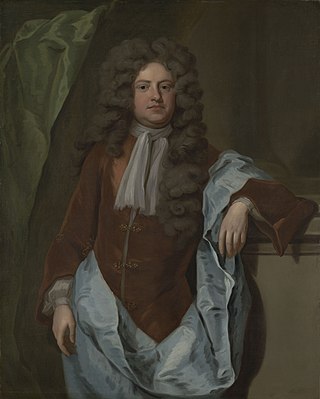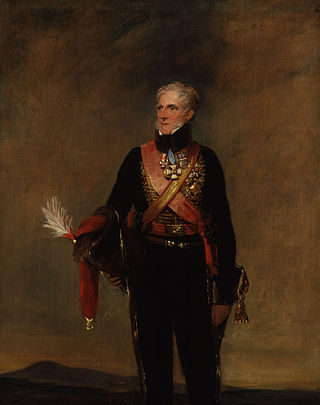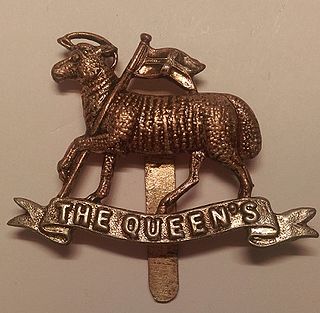
Charles Montagu, 1st Earl of Halifax,, was an English statesman and poet. He was the grandson of the 1st Earl of Manchester and was eventually ennobled himself, first as Baron Halifax in 1700 and later as Earl of Halifax in 1714. As one of the three members of the so-called Whig Junto, Montagu played a major role in English politics under the reigns of King William III and Queen Anne. He served as Chancellor of the Exchequer from 1694 to 1699 and as First Lord of the Treasury from 1714 until his death the following year. He was also president of the Royal Society and a patron of the scientist Isaac Newton.

The Coldstream Guards is the oldest continuously serving regular regiment in the British Army. As part of the Household Division, one of its principal roles is the protection of the monarchy; due to this, it often participates in state ceremonial occasions. The Regiment has consistently provided formations on deployments around the world and has fought in the majority of the major conflicts in which the British Army has been engaged.

Henry William Paget, 1st Marquess of Anglesey, styled Lord Paget between 1784 and 1812 and known as the Earl of Uxbridge between 1812 and 1815, was a British Army officer and politician. After serving as a member of parliament for Carnarvon and then for Milborne Port, he took part in the Flanders Campaign and then commanded the cavalry for Sir John Moore's army in Spain during the Peninsular War; his cavalry showed distinct superiority over their French counterparts at the Battle of Sahagún and at the Battle of Benavente, where he defeated the elite chasseurs of the French Imperial Guard. During the Hundred Days he led the charge of the heavy cavalry against Comte d'Erlon's column at the Battle of Waterloo. At the end of the battle, he lost part of one leg to a cannonball. In later life he served twice as Master-General of the Ordnance and twice as Lord Lieutenant of Ireland.
The Earl of Courtown, in the County of Wexford, is a title in the Peerage of Ireland. It was created on 12 April 1762 for James Stopford, 1st Baron Courtown. He had previously represented County Wexford and Fethard in the Irish House of Commons. Stopford had already been created Baron Courtown, of Courtown in the County of Wexford, on 19 September 1758, and was made Viscount Stopford at the same time he was given the earldom. These titles are also in the Peerage of Ireland. He was succeeded by his eldest son, the second Earl. He was a Tory politician and served under William Pitt the Younger as Treasurer of the Household from 1784 to 1793. On 7 June 1796, he was created Baron Saltersford, of Saltersford in the County Palatine of Chester, in the Peerage of Great Britain. This title gave him and his descendants an automatic seat in the House of Lords.

Field Marshal George Hay, 8th Marquess of Tweeddale, was a British soldier and administrator. He served as a staff officer in the Peninsular War under Arthur Wellesley and was with Wellesley at the Second Battle of Porto when they crossed the Douro river and routed Marshal Soult's French troops in Porto. Hay also saw action at the Battle of Bussaco and at the Battle of Vitoria. He later served in the War of 1812 and commanded the 100th Regiment of Foot at the Battle of Chippawa when he was taken prisoner of war. He went on to become governor of Madras and, at the same time, Commander-in-Chief of the Madras Army, in which role he restored the discipline of the army, which had been allowed to fall into a relaxed state.

The Queen's Royal Regiment (West Surrey) was a line infantry regiment of the English and later the British Army from 1661 to 1959. It was the senior English line infantry regiment of the British Army, behind only the Royal Scots in the British Army line infantry order of precedence.

Lieutenant-General Albemarle Bertie, 9th Earl of Lindsey was a British nobleman and general.

Lieutenant-general Sir Charles Stuart,, was a British nobleman and soldier. The fourth son of John Stuart, 3rd Earl of Bute, and Mary Wortley Montagu, he was born in Kenwood House, London. There is a famous painting in the Tate Gallery, London, of him aged 10 stealing eggs and chicks from a bird's nest.
The following units and commanders fought in the Battle of Naseby during the First English Civil War.

General Sir Charles Wills was a British Army officer and politician who served as Lieutenant-General of the Ordnance sat as a member of parliament for Totnes from 1718 to 1741.
Brigadier Edward Montagu or Montague was a British Army officer and politician who sat in the House of Commons from 1722 to 1734.

The Tangier Garrison was the land force which oversaw the defence of English Tangier between 1661 and 1684 when it was evacuated. It was part of the English Army, the de facto standing army that Charles II established following the Restoration. Charles II received Tangier as part of the Marriage Treaty with Portugal in 1661. He appointed Henry Mordaunt, 2nd Earl of Peterborough as governor and, on 30 January 1662, the new garrison took up its duties. Peterborough was not a successful appointment as governor, and Andrew, Lord Rutherford, was appointed in 1662/1663 to replace him.

General Sir Richard Chambré Hayes Taylor was a senior British Army officer who served in the Second Anglo-Burmese War, the Crimean War and the Indian Mutiny. Joining the General Staff in 1860, he was the British Army's Inspector General of Recruiting, then Deputy Adjutant-General to the Forces, briefly Adjutant-General, and finally for three years Governor of the Royal Military College, Sandhurst. He was also Colonel of the Queen's Own Cameron Highlanders and the East Surrey Regiment.

Sir George Osborn, 4th Baronet was born into the British aristocracy. He fought in the American Revolutionary War as a British officer. He served in the House of Commons from 1769 to 1784 - before, during, and after that conflict. In 1777 he led a detachment of the Guards Brigade at the battles of Brandywine and Germantown. Besides his combat duties, he served as the inspector of the Hessian mercenary soldiers. After returning from America in 1777 he was promoted in rank to general officer. In 1787 he received advancement to lieutenant general. He is remembered in United States history for a clever but harsh comment that he made concerning the dead body of an American officer.
James Johnston was a general of the British Army, colonel of the Royal Horse Guards then colonel of the Scots Greys where he succeeded his sister's husband, George Preston.
General Sir Edward Walter Forestier-Walker was a British Army officer who became Commander-in-Chief, Scotland.
The 1895 Birthday Honours were appointments by Queen Victoria to various orders and honours to reward and highlight good works by citizens of the British Empire. The appointments were made to celebrate the official birthday of The Queen, and were published in The Times on 25 May 1895 and in The London Gazette on 25 May 1895 and on 11 June 1895.
The 1869 Birthday Honours were appointments by Queen Victoria to various orders and honours to reward and highlight good works by citizens of the British Empire. The appointments were made to celebrate the official birthday of the Queen, and were published in The London Gazette on 2 June 4 June and 1 July 1869.
The 1871 Birthday Honours were appointments by Queen Victoria to various orders and honours to reward and highlight good works by citizens of the British Empire. The appointments were made to celebrate the official birthday of the Queen, and were published in The London Gazette on 20 May 1871.
The 1881 Birthday Honours were appointments by Queen Victoria to various orders and honours to reward and highlight good works by citizens of the British Empire. The appointments were made to celebrate the official birthday of the Queen, and were published in The London Gazette on 24 May 1881.










